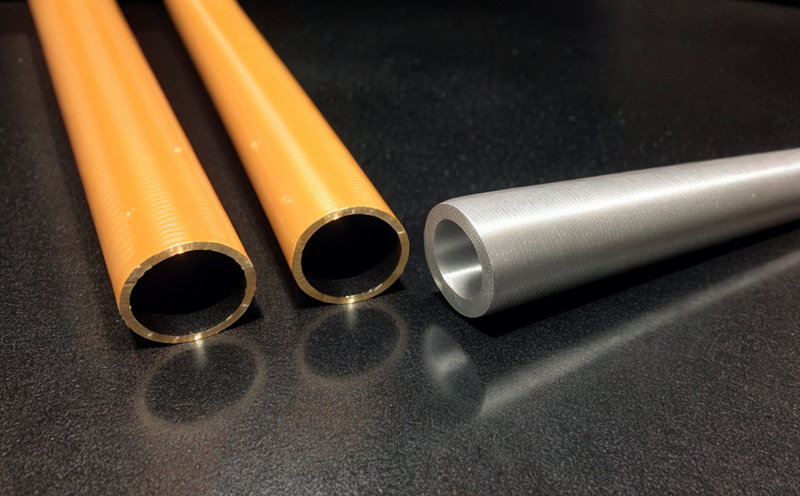EN 6080 Fatigue Testing of Pressurized Composite Panels
The European standard EN 6080:1997, titled "Fatigue testing of pressurised composite panels," is a critical tool for aerospace and aviation industries. This standard ensures the safety, reliability, and longevity of composite materials used in aircraft structures by subjecting them to cyclic loading conditions that simulate real-world flight dynamics.
Composite materials, such as carbon fiber reinforced polymers (CFRP), are widely used due to their high strength-to-weight ratio but must undergo rigorous testing to ensure they can withstand the stresses encountered during manufacturing and operational phases. Fatigue tests under pressurized conditions help identify potential weaknesses or flaws in composite panels that could lead to failure under cyclic loading.
The EN 6080 procedure involves subjecting a specimen to a series of tensile, compressive, and shear stress cycles while simultaneously applying internal pressure. The goal is to determine the fatigue life of the material by monitoring crack initiation and propagation until failure occurs. This testing method provides insights into how composite materials behave under conditions similar to those found in pressurized aircraft structures.
For accurate results, proper specimen preparation is essential. Specimens are typically cut from larger panels using precise methods to ensure uniformity across all samples being tested. Once prepared, the specimens are mounted on fixtures designed specifically for this type of testing to maintain consistent boundary conditions throughout the test cycle.
The instrumentation used during these tests includes strain gauges, load cells, displacement sensors, and pressure transducers, among others. These devices measure various parameters such as stress levels, deformation rates, and internal pressures within the specimens. Data collected from these instruments are analyzed to assess the fatigue behavior of each specimen, providing valuable information about its structural integrity.
Following completion of the test, detailed reports summarizing the results are generated using industry-standard software tools. These reports include graphs depicting stress-strain relationships throughout different stages of the test as well as images highlighting any visible cracks or defects observed during testing. Such documentation serves not only as evidence supporting compliance with regulatory requirements but also aids in refining future designs and manufacturing processes.
Understanding the importance of this standard is crucial for any organization involved in developing new composite components for aerospace applications. By adhering to EN 6080, manufacturers can demonstrate their commitment to quality control while simultaneously ensuring public safety by producing reliable products that meet strict industry standards.
Why It Matters
The reliability and durability of materials used in aircraft structures are paramount for maintaining passenger safety. Fatigue testing under pressurized conditions plays a vital role in assessing the fatigue performance of composite panels, which can be subjected to severe cyclic loading during flight operations.
- Ensures Safety: By identifying potential weaknesses early on through controlled laboratory environments, manufacturers can prevent catastrophic failures in actual service situations.
- Enhances Reliability: Testing according to international standards like EN 6080 helps ensure that materials perform consistently across various environmental conditions encountered during manufacturing and operation.
- Saves Costs: Identifying flaws before mass production reduces the need for expensive recalls or redesigns later in the development process.
These factors contribute significantly to reducing risks associated with material failure, thereby enhancing overall safety standards within the aviation industry. Compliance with such rigorous testing protocols not only meets regulatory expectations but also builds consumer trust and confidence in manufacturers' products.
Applied Standards
The European standard EN 6080:1997, "Fatigue Testing of Pressurised Composite Panels," provides a framework for conducting fatigue tests on composite materials used in aerospace structures. This standard is widely recognized and followed by organizations involved in designing, manufacturing, and certifying aircraft components.
EN 6080 specifies the methodology for applying cyclic loading to specimens while simultaneously maintaining internal pressure within specified ranges. It details the necessary equipment requirements, including test fixtures, strain gauges, load cells, displacement sensors, and pressure transducers. The standard also outlines procedures for preparing test samples, mounting them onto appropriate fixtures, calibrating measurement devices, and performing the actual tests.
Additionally, EN 6080 includes guidelines on analyzing collected data to evaluate material fatigue behavior accurately. This involves monitoring stress-strain relationships over different stages of loading cycles as well as identifying any signs of crack initiation or propagation. The results serve as critical inputs for assessing the structural integrity and expected service life of composite panels.
Compliance with EN 6080 ensures that manufacturers adhere to recognized best practices, contributing to improved product quality and reliability while meeting regulatory requirements set forth by aviation authorities worldwide.





